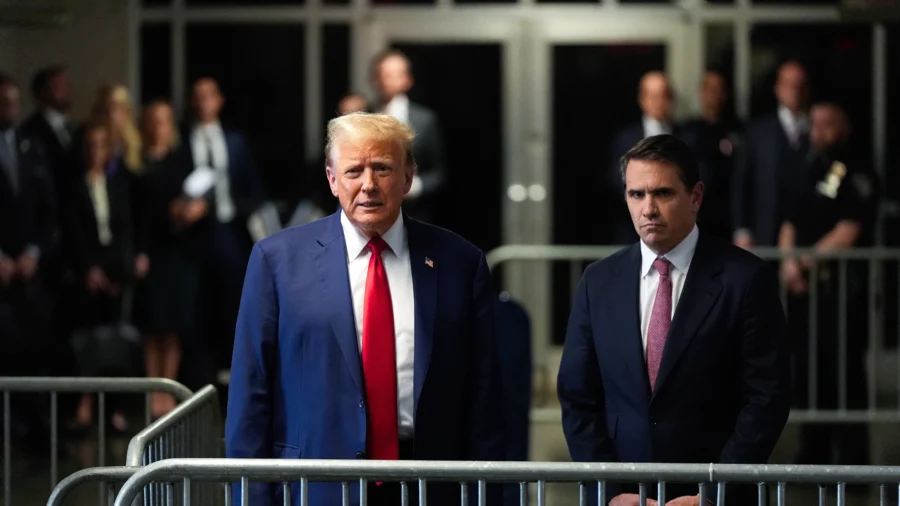Attorneys for former President Donald Trump are seeking to push deadlines and file additional motions, including a possible request for sanctions, in the classified documents case prosecuted by special counsel Jack Smith after revelations that the order of files in the physical boxes of documents do not match the digital scans.
U.S. District Judge Aileen Cannon allowed the defense to file the extra reply brief on May 6. Both sides have accused the other of mischaracterizing the situation to the judge as a May 9 deadline for the defense to file expert disclosures related to classified information litigation loomed overhead.
In a separate paperless order, Judge Cannon paused that deadline on May 6. “Order setting second set of pretrial deadlines/hearings to follow,” the docket reads.
On May 3, the prosecutors had made the admission that the files were not in the same order, and in a footnote admitted that they had made misrepresentations to the court about this issue.
“President Trump and counsel are deeply troubled to be learning of these facts approximately 11 months after the charges were filed in this case,” Trump attorneys wrote.
Who Handled Evidence?
Defense attorneys argued this revealed that prosecutors have since “day one” made “false assertions of compliance with their discovery obligations.”
The inconsistency had been confirmed by prosecutors after issues were flagged by attorneys for Walt Nauta, valet to President Trump, who was charged for obstruction alongside the former president as a codefendant.
Attorneys for President Trump argued they had not examined the boxes themselves when they had the scans, as it “never occurred to us, until last Friday, that the prosecution team could not be trusted to perform the basic task of maintaining the integrity of such evidence despite the expansive resources at their disposal.”
In addition to the documents not being in the same order with prosecutors unaware of the reason, prosecutors had acknowledged that the scans provided to the defense were made by an outside vendor as part of a related civil case. The defense argued that process “lacked the constitutional, statutory, and ethical safeguards that guide discovery obligations in this criminal case.”
After the May 3 revelation, President Trump’s legal team reached out to the prosecutors with a discovery letter requesting materials related to this issue.
“These issues implicate, for example, President Trump’s motion to suppress evidence seized from Mar-a-Lago and the motion to dismiss based on prosecutorial misconduct,” defense attorneys argued.
The defense plans to request sanctions on the special counsel depending on the discovery produced by this request, and may also file a motion to dismiss charges “if the Office cannot prove in a reliable way how it seized and handled the key evidence in the case, which will be a central issue at any trial.”
Strategy Change
They also renewed arguments to delay the May 9 deadline.
“Defense counsel cannot reasonably be expected to specify classified information that they intend to offer at trial when the Office recently disclosed that one of the most basic premises of the criminal justice process—that the prosecution team can be trusted to maintain existing evidence—no longer applies,” they argued.
They revealed that they will use classified information to cross-examine witnesses about procedures for handling such information, and may now look for experts to focus on chain-of-custody and search-execution deficiencies.
Defense attorneys also argued that prosecutors have “repeatedly and unjustly” asked for “unworkable deadlines,” accusing them of political motivations.
Additional Discovery Request
Defense attorneys argued that prosecutors cannot “seriously contend” that the new admission of evidence being moved could be irrelevant to the ongoing litigation.
They are requesting all communications, memos, reports, letters, notes, and other documents related to instructions given to the “filter team” that handled evidence.
Prosecutors had noted that the filter team “took care to ensure that no documents were moved from one box to another, but it was not focused on maintaining the sequence of documents within each box.”
There was also a separate “investigation team” that handled on-site review, and defense attorneys are requesting their instructions, and communications between the two teams.
The defense is also requesting documents related to the chain of custody of boxes stored overnight in the FBI field office in Miami, and boxes that were flown to Washington.
They also requested documents related to the process the FBI used to replace handwritten sheets with classified cover sheets, as well as the deviations from the process that prosecutors had alluded to in their filing.
Defense attorneys also wanted documents related to personnel involved in this process and the “several reasons” for which prosecutors said they were allowed access.
The defense also sought clarity of what differences there are between the physical boxes and scans, and the communications that led to this disclosure on the part of the prosecutors.
From The Epoch Times


